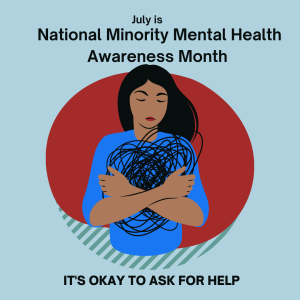
July is National Minority Mental Health Awareness Month. A crucial time to shed light on the mental health challenges faced by minority communities. While mental health disparities affect various marginalized groups, individuals with rare or chronic conditions within these communities often face additional hurdles.
National Minority Mental Health Awareness Month aims to increase awareness about the mental health disparities that exist among minority groups and to promote equitable access to mental health resources and services. It serves as an opportunity to highlight the unique struggles faced by individuals from diverse racial and ethnic backgrounds and to advocate for culturally sensitive and inclusive mental health care.
Impact of Rare or Chronic Conditions on Mental Health:
Living with a rare or chronic condition can be emotionally and mentally challenging. Minority groups affected by these conditions often confront a distinct set of obstacles, such as limited access to specialized care, cultural stigma, language barriers, and a lack of representation in clinical trials and research. These factors can further amplify the impact on mental health and well-being, leading to increased rates of anxiety, depression, isolation, and reduced overall quality of life.
Limited Access to Specialized Care:
Minority communities with rare or chronic conditions may face difficulties in accessing specialized care providers who are knowledgeable about their specific health concerns. A scarcity of healthcare professionals who understand cultural nuances, languages, and the unique challenges associated with these conditions can hinder appropriate diagnosis, treatment, and ongoing support.
Cultural Stigma and Lack of Awareness:
Cultural stigma surrounding mental health can disproportionately affect minority populations. Traditional beliefs, cultural practices, and inadequate education about mental health conditions can lead to misconceptions and discourage individuals from seeking help. Moreover, within minority communities, mental health concerns are often stigmatized or viewed as signs of weakness, making it challenging for individuals to openly discuss and seek support for their mental well-being.
Language and Communication Barriers:
Language barriers can present substantial challenges in seeking mental health support. Access to culturally and linguistically appropriate mental health services may be limited, preventing individuals from expressing their needs, concerns, and emotions effectively. This lack of understanding can lead to misdiagnosis, inappropriate treatment, and feelings of frustration or isolation.
Underrepresentation in Research and Clinical Trials:
Minority populations, including those with rare or chronic conditions, are often underrepresented in clinical trials and research studies. This can result in a lack of evidence-based interventions tailored to their specific needs and an insufficient understanding of the intersection between mental health and their medical conditions. The absence of diverse representation hampers the development of effective treatments and interventions, exacerbating mental health disparities.
Addressing the Challenges and Promoting Mental Health Equity:
To promote mental health equity for minority groups with rare or chronic conditions, a multifaceted approach is necessary:
- Increased Cultural Competence: Healthcare providers and professionals should receive cultural competency training to better understand and address the unique mental health challenges faced by minority communities.
- Community Education and Awareness: Promote mental health awareness within minority communities through culturally sensitive campaigns, workshops, and support groups to combat stigma, foster dialogue, and encourage help-seeking behaviors.
- Enhanced Access to Culturally Appropriate Care: Ensure that mental health services are accessible, affordable, and inclusive, catering to the linguistic, cultural, and religious diversity of minority populations.
- Diverse Representation in Research: Encourage diversity and representation in mental health research and clinical trials to generate data that accurately reflects the experiences and needs of minority groups.
- Reach out for help. We have compiled a list of mental health hotlines that can serve as resources when extra support is needed. Click here to access our resources.

Recent Comments